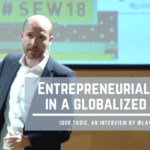Author: Igor Tasic
It is ludicrous to see how companies around the world are looking to innovate and get back their “entrepreneurial spirit.” Even funnier is the “ecosystem” such chase has created around it. From management consultants (now wearing T-shirts/Ipads and dropping the suit-tie/Lenovo pack) to accelerators/incubators/hubs (and whatever support system you can fit in the category), passing by mentors who are fresh from college.
Don’t get me wrong. This is not a criticism or judgment. There is no right or wrong here (or anywhere). The fun part is just related to the process of how companies have tried to “reinvent” themselves since the 2008 crisis. As Millenials, Z’s, etc. join the workforce as consumers and decision-makers, something seems to be wrecking the gray hairs. A lot of movements, open innovation programs, purpose-driven products, and services have been created, but still, something seems to be missing.
While everybody now is mindful and wants to make the world a better place, the old personal “Ego” seems to be struggling to survive. And guess what. It does survive. In the very form of products, services, and speeches. All created to boost an ego that wants to be recognized, awarded, photographed.
Innovation or entrepreneurial mindset is not something you foster top-down. Anyone who has sold anything knows that by heart. You go there, try to do something people want and if they don’t, you try again. You can call it “pivot,” “agile,” or whatever will get you closer to rooms full of colorful puffs and post-its. The hard truth is simpler. People either find what you do useful or they won’t buy/support/get it.
Adam Smith was right. People are liberal capitalists even if they don’t want to be called by that. Entrepreneurs, like artists, invent things because they can’t stop themselves from doing it. In the process, they bring along a bunch of other people, create new markets, and destroy the status quo. It happens in business, governments, and your family. What expert entrepreneurs seem to teach us is that once the new thing is created, just let it evolve with minimum bureaucracy, analysis, committees, and powerpoints. If it does help people, people will ask for more. If not, you already know at least one way where not to go.
Are you working/living within a culture that allows that to happen as free as possible?





